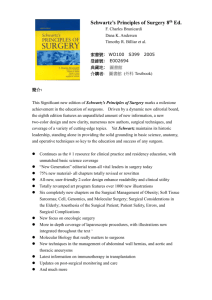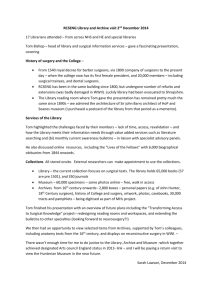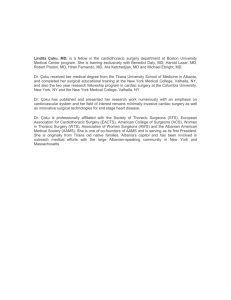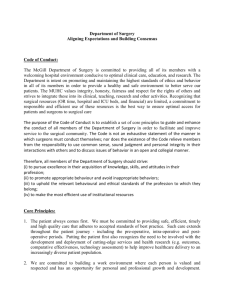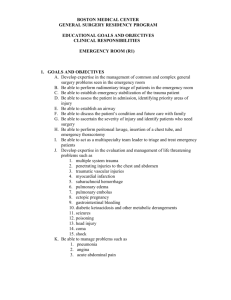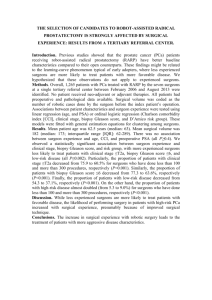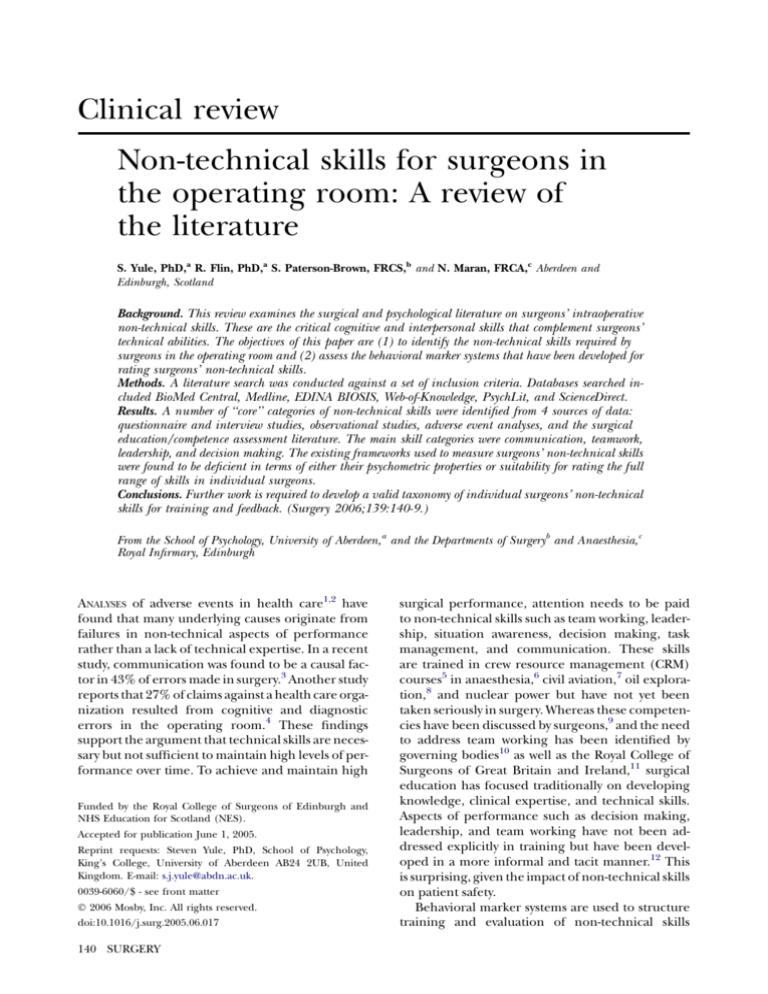
Clinical review
Non-technical skills for surgeons in
the operating room: A review of
the literature
S. Yule, PhD,a R. Flin, PhD,a S. Paterson-Brown, FRCS,b and N. Maran, FRCA,c Aberdeen and
Edinburgh, Scotland
Background. This review examines the surgical and psychological literature on surgeons’ intraoperative
non-technical skills. These are the critical cognitive and interpersonal skills that complement surgeons’
technical abilities. The objectives of this paper are (1) to identify the non-technical skills required by
surgeons in the operating room and (2) assess the behavioral marker systems that have been developed for
rating surgeons’ non-technical skills.
Methods. A literature search was conducted against a set of inclusion criteria. Databases searched included BioMed Central, Medline, EDINA BIOSIS, Web-of-Knowledge, PsychLit, and ScienceDirect.
Results. A number of ‘‘core’’ categories of non-technical skills were identified from 4 sources of data:
questionnaire and interview studies, observational studies, adverse event analyses, and the surgical
education/competence assessment literature. The main skill categories were communication, teamwork,
leadership, and decision making. The existing frameworks used to measure surgeons’ non-technical skills
were found to be deficient in terms of either their psychometric properties or suitability for rating the full
range of skills in individual surgeons.
Conclusions. Further work is required to develop a valid taxonomy of individual surgeons’ non-technical
skills for training and feedback. (Surgery 2006;139:140-9.)
From the School of Psychology, University of Aberdeen,a and the Departments of Surgeryb and Anaesthesia,c
Royal Infirmary, Edinburgh
ANALYSES of adverse events in health care1,2 have
found that many underlying causes originate from
failures in non-technical aspects of performance
rather than a lack of technical expertise. In a recent
study, communication was found to be a causal factor in 43% of errors made in surgery.3 Another study
reports that 27% of claims against a health care organization resulted from cognitive and diagnostic
errors in the operating room.4 These findings
support the argument that technical skills are necessary but not sufficient to maintain high levels of performance over time. To achieve and maintain high
Funded by the Royal College of Surgeons of Edinburgh and
NHS Education for Scotland (NES).
Accepted for publication June 1, 2005.
Reprint requests: Steven Yule, PhD, School of Psychology,
King’s College, University of Aberdeen AB24 2UB, United
Kingdom. E-mail: s.j.yule@abdn.ac.uk.
0039-6060/$ - see front matter
Ó 2006 Mosby, Inc. All rights reserved.
doi:10.1016/j.surg.2005.06.017
140 SURGERY
surgical performance, attention needs to be paid
to non-technical skills such as team working, leadership, situation awareness, decision making, task
management, and communication. These skills
are trained in crew resource management (CRM)
courses5 in anaesthesia,6 civil aviation,7 oil exploration,8 and nuclear power but have not yet been
taken seriously in surgery. Whereas these competencies have been discussed by surgeons,9 and the need
to address team working has been identified by
governing bodies10 as well as the Royal College of
Surgeons of Great Britain and Ireland,11 surgical
education has focused traditionally on developing
knowledge, clinical expertise, and technical skills.
Aspects of performance such as decision making,
leadership, and team working have not been addressed explicitly in training but have been developed in a more informal and tacit manner.12 This
is surprising, given the impact of non-technical skills
on patient safety.
Behavioral marker systems are used to structure
training and evaluation of non-technical skills
Surgery
Volume 139, Number 2
in high-demand professions.13,14 These marker systems are based on skills taxonomies and are used
to identify and rate ‘‘observable, non-technical
behaviours that contribute to superior or substandard performance.’’15 Behavioral maker systems are
context specific and must be developed for the domain in which they are to be used. For effective nontechnical skills assessment, the system needs to be
explicit, transparent, reliable, and valid. For example, the taxonomies developed for pilots7 and anaesthetists16 have been developed systematically and
subjected to experimental and practical evaluation.
The General Medical Council (GMC) is considering introducing licences to practice, supported
by periodic revalidation of all doctors in the
United Kingdom (including surgeons). The revalidation will be based on the core content of the
Good Medical Practice document.17 Good medical
practice includes communication skills, teamwork,
and leadership. With the long-term aim of developing training in these areas for surgeons, the objective of the current review is to (1) identify the
non-technical skills required by surgeons in the
operating room and (2) assess the behavioral
marker systems that have been developed for rating surgeons’ non-technical skills.
MATERIAL AND METHODS
The literature search was carried out by consulting a number of different sources:
d
d
d
d
d
d
Databases and University library catalogues, including
BioMed Central, Medline, Web-of-Knowledge, EDINA
BIOSIS, PsychLit, and ScienceDirect.
Proceedings from recent applied health care, psychology, and human factors conferences.
The Library of the Royal College of Surgeons of
Edinburgh.
Bibliographies from relevant research articles and
book chapters.
Previous research on non-technical skills in aviation,
nuclear power, and anaesthesia.
Search of key journals: eg, Surgery, Annals of Surgery,
British Journal of Surgery, British Medical Journal, Human
Factors, Quality and Safety in Healthcare, and Safety Science.
The following search terms were used: non-technical/skills/surgeon/surgeons/surgical/communication/
decision making/leadership. cognitive/training/trainees/
operating theatre/Protein levels of proinflammatory cytokines and chemokines in BALF. assessment/competence/
error/CRM/risk/patient. safety/behaviour/behavioural
markers/simulation/medicine/medical. The criteria
for inclusion in this review were (1) addresses surgeons’ non-technical skills (trainee or consultant),
Yule et al 141
(2) based on intraoperative environment, and (3)
published in English. This review is subdivided by
the following sources:
i. Questionnaire and interview studies with surgeons
ii. Observational studies of surgeons (in-vivo, videotaped, simulated)
iii. Surgical adverse event analyses
iv. Surgical education, training and competence
assessment
RESULTS
Questionnaire and interview studies. The Surgical Team Assessment Record (STAR): The STAR questionnaire was designed to study the role of human
factors in surgical outcomes18 and measure the organizational, situational, team, and personal factors
thought to contribute to surgical performance.
Questions on team factors cover dealing with unexpected events, communication between theater
teams, preoperative briefings, confidence in other
team members’ abilities, and the level of harmony
or disharmony among team members. Personal factors include technical skill, mental preparedness,
and keeping pace with events. This questionnaire
was used by de Leval et al18 to collect postoperative
rating data from all cardiac theater staff involved
in 243 neonatal arterial switch operations. Logistic
regression analysis found the ratings of these factors
did not significantly predict surgical outcomes.
However, because the psychometric properties of
the rating form did not appear to have been assessed, and staff did not appear to have been trained
to make such judgements, the reliability of their
ratings is open to question.
The Operating Room Management Attitudes Questionnaire (ORMAQ): The ORMAQ19 is a survey instrument that measures the attitudes of operating
theatre personnel toward safety, error, teamwork,
leadership, and authority. Helmreich and Schaefer20 analyzed ORMAQ data from 53 surgeons, 45
anaesthetists, and 54 theatre nurses in a European
hospital. There was general agreement that communication and coordination were as important
as technical proficiency for safety and efficiency
in the operating theater. Surgeons (and nurses)
were more supportive of a culture in which junior
members of staff do not question the decisions
made by senior staff members, and surgeons
were less accepting than anaesthetists that a preoperative briefing was important for teamworking.
In related research, cross-department planning
and debrief meetings for individual cases were
associated with improved team coordination and
142 Yule et al
Surgery
February 2006
Table I. Non-technical skills for surgical trainees
identified by Baldwin et al26 and tested for
feasibility by Paisley et al63
Skills
Teamwork
Seeks advice when beyond limits of
confidence
Can be trusted to carry out instructions
Able to communicate clearly with other
staff members
Accepts feedback on own performance
Can keep to time
Understands other staff members’
points of view
Delegates to others when appropriate
Aware of the role of other specialities
Able to offer constructive criticism to
others
Can cope with unreasonable colleagues
Other non-technical skills
Reviews diagnosis and management
regularly
Adapts quickly if problems in
operating/management arise
Knows when not to intervene
Decides quickly in an emergency
Can improvise where necessary
Median
weighting
4
4
3
3
3
3
3
3
3
2
3
3
3
3
3
faster learning rates in an analysis of the implementation of a new cardiac procedure in 16 different hospitals.21
Another ORMAQ study of theater staff in 2
hospitals22 (locations not specified), found that
surgeons generally advocated a structured hierarchy of authority (anaesthetists and nurses valued
a flatter team hierarchy). Surgeons were also reluctant to recognize personal vulnerability to stress.
Similar results are reported by Sexton et al23 who
analyzed ORMAQ data from 851 surgical and anaesthetic consultants, nurses, and residents in 12
teaching and nonteaching hospitals in the United
States and Europe. Surgeons were more confident
about their ability to perform well when fatigued
than surgical trainees, anaesthetic consultants, or
theater nurses. Consultant surgeons were also
more in favor of a strict hierarchy in the operating
room and less likely to encourage junior team
members to question the decisions made by
more senior team members (ie, consultants).
These results are in contrast to those presented
by Edmondson24 who found that the ability to
speak up in the operating room was crucial to
the successful implementation of new technology
in cardiac surgery. She found that the most
effective leaders minimized power and status differences rather than endorsed them.
In the study by Sexton et al,23 both consultant
and trainee surgeons rated the quality of teamworking with anaesthetic staff highly (62%). This
was in contrast to the 41% of anaesthetic staff
who rated teamworking with their surgical colleagues highly. Corroborating evidence for this
mismatch is provided in an ORMAQ study of
anaesthetists (n = 222) in Scottish hospitals25
where anaesthetists rated the quality of teamwork
with surgeons as lower than that with other theater
personnel.
Surgeons’ opinions of critical surgical skills: Many
studies have used opinions of subject matter
experts (senior surgeons) to identify the skills
required by good surgeons. Some of these form
the basis for assessment tools. The elements
incorporated in the Edinburgh Basic Surgical
Training Assessment Form (EBSTAF) were based
on a survey of consultant surgeons26 who identified 5 domains of skill required for surgeons:
(1) technical skills, (2) clinical skills, (3) communication with patients and relatives, (4) teamwork
skills, and (5) application of knowledge. A delphi
technique was used to rank each skill within the 5
domains on a 4-point scale, from (4) ‘‘absolutely
essential,’’ to (1) ‘‘irrelevant.’’ Table I lists the
teamwork skills that were identified. Two of these
(seeking advice and trusted to carry out instructions) were deemed ‘‘absolutely essential’’ and
were regarded often as more important than technical skills. Other skills listed relate to communication and maintaining situation awareness as
well as monitoring the performance of self and
others and managing workload and time
(Table I).
Cuschieri et al27 conducted a survey of 58 ‘‘master’’ surgeons’ opinions of surgical trainees. More
than 70% agreed that the top 3 attributes for
trainee surgeons were (1) cognitive ability, (2) innate dexterity, and (3) personality. The dominant
view among master surgeons was that the impact
of cognitive ability and personality traits (ie, nontechnical skills) on eventual operative technical
competence was less important than dexterity
(ie, technical skill).
Analysis from a similar interview study with 33
Canadian surgeons28 found that 49% of the sample rated mental skills as most important in surgery, compared with 41% technical and 10%
physical. This study also found several emerging
themes related to mental preparation in the operating theater, including commitment, self-belief,
positive imagery, mental readiness, and distraction
Yule et al 143
Surgery
Volume 139, Number 2
control. Surgeons in all specialities also reported
significantly lower levels of readiness (particularly
mental readiness) before unsuccessful operations.
Other surgeons have endorsed these views, for example, Youngson29 recognized the importance of
communication skills and cognitive ability such as
decision making in surgical performance but conceded that the craft aspect of surgical competence
receives ‘‘heavy emphasis’’ and ‘‘decision-making,
as an entity in its own right, is poorly tutored.’’
Observational studies of surgeons. Observations
of actual operations---in vivo: de Leval et al18 observed
243 neonatal arterial switch operations performed
by 21 cardiac surgeons in 16 UK centers. On the
basis of this research and studies of excellence in
surgery,28,30 Carthey et al31 developed a ‘‘framework of the individual, team and organisational
factors that underpin excellence in paediatric surgery.’’ Non-technical skills were rated in their taxonomy at the individual (surgeon) level, in
addition to ‘‘technical’’ skill (Table II). Leadership,
communication, and coordination were listed as
team level behavioral markers.
This framework was used by Carthey et al32 to rate
the behavior of 16 surgeons (from the original sample) during 166 operations. Logistic regression
models were run to provide ‘‘procedural excellence
scores’’ using 2 outcomes: probability of death and
the probability of death or near miss. Although no
statistical analyses were carried out, they examined
the behavioral marker scores to explain differences
in case outcome (surgical excellence). For example,
3 of 4 surgeons who were rated highly on all of the
individual markers experienced no ‘‘uncompensated major events’’ (errors leading to the event
that were not recovered). On the basis of these finding, the authors argue that behavioral markers can
be used to explain differences in performance between cardiac surgery teams.
Surgical team behavior during ‘‘live’’ operations
in the United States was studied by Roth et al.33 In
this study, a surgeon and a human factors engineer
each took notes about communications, information flow, and task execution during 10 complex
intestinal tract or liver operations. These notes
were analyzed to reveal system strengths and
vulnerabilities, adverse events, near misses, and
compensation strategies. This revealed several
non-technical issues, such as cognitive and collaborative demands of surgeons (ie, competing tasks),
adaptive strategies, conflicting goals, and discipline-spanning goals. A structured method of observing performance in theater was not used; this
study focused instead on descriptions of behavior
to uncover emerging themes.
Table II. Individual level behavioral markers of
surgical excellence
Mental readiness
Cognitive flexibility (ability to switch between
strategies/hypotheses)
Anticipation (of problem before they get out of control)
Team adaptation (reaction to changes in the team)
Safety awareness (how the surgeon handles various
safety related goals)
Situational awareness
Communication style
Reprinted with permission from Carthey et al.32
Helmreich and Schaefer20 observed operations
in a European teaching hospital using 9 categories
of ‘‘specific behaviours that can be evaluated in
terms of their presence or absence and quality.
that are essential for safe and efficient function.’’
Using this behavior categorization (Table III) for
the observations, they identified a number of instances of error relating to inadequate teamwork,
failures in preparation, briefings, communication,
and workload distribution. As this did not provide
a quantitative database against which to measure
interventions such as training. Helmreich et al.34
designed the Operating Room Checklist (ORCL),
which was based on a behavioral marker system
from aviation15,35 and consisted of a list of behavior categories with rating scales that could be
used to assess the non-technical performance of
operating teams. The ORCL system was principally
designed to measure team behaviors rather than to
rate the non-technical skills of individual surgeons,
and there do not appear to be any published
reports on its use as a teaching or research tool.
The Observational Teamwork Assessment for
Surgery tool (OTAS) was used by Healey et al36 to
observe 3 phases of surgery: pre-, intra-, and postoperative. The OTAS is a measure of team rather
than individual performance in surgery and is
based on a generalized model of teamwork.37 It incorporates concurrent observation of task completion and teamwork by 2 independent raters, a
similar method to that used by Roth et al.33 Teamwork was assessed using 7-point behavioral observation scales that cover cooperation, leadership,
coordination, awareness, and communication for
relevant roles in the theater. After taking notes on
task-related behaviors, the observer provided ratings for the ‘‘overall impression of team behaviour’’
in each phase. Preliminary results from a sample of
50 general cases indicate that behavior ratings differ
for each scale and that a potential relationship
exists between coordination and communication.
144 Yule et al
Surgery
February 2006
Table III. Errors observed in operating theaters classified by behavior category
Behavior category
Communications/decisions
Preparation/planning/vigilance
Workload distribution/distraction avoidance
Briefings
Inquiry/assertion/advocacy
Interpersonal relationships/group climate
Team self-critique
Leadership/followership/concern for tasks
Conflict resolution
Error
Surgeon’s failure to inform anaesthetist
Failure to anticipate events during complex procedure
Failure to monitor other team activities
Consultant distracted from making a decision by problems
reported from another operating theatre
Failure to brief own team
Failure to discuss alternative procedure
Hostility and frustrations owing to poor team coordination
Failure to debrief operation to learn from situation
Failure to establish leadership for operating room team
Unresolved conflicts between surgical team and anaesthetists
Reprinted with permission from Helmreich and Schaefer.20
However, no formal statistical analyses have been
published, and the authors acknowledge that establishing the validity of such an assessment of surgical
team performance is a ‘‘substantial undertaking.’’36
Observations of actual operations---from videotape:
Using video recording to conduct behavioral analysis is ideally suited to complex domains because
events involving dynamic decision making and
teamwork can be replayed to analyze the full range
of behaviors. Medical videotaped studies to date
focus on trauma teams38 or anaesthetic procedures.39 Probably because of current ethical and
legal constraints, there seem to be very few centers
videotaping surgical operations and using these for
non-technical skills analysis. In one study, Dominguez40 interviewed 20 surgeons asked to roleplay as the supervising surgeon for the case, as
they watched a videotape of a ‘‘challenging’’ laparoscopic gallbladder removal. This revealed particular cognitive skills relating to risk assessment,
anticipation, prediction of difficulty, and decisions
about possible actions.
Observations of simulated operations: Simulation
studies with electronic manikins are more common
in anaesthesia than in surgery for both training41
and assessment.42 However, simulators have been
used with surgical teams, such as the TeamOriented Medical Simulation which incorporated
both a computer-controlled anaesthetic mannequin and a laparoscopic simulator.43 This affords
increased integration of training for surgeons and
anaesthetists.44 Lower-fidelity forms of simulation
such as computer-based tasks have been used to
test and train cognitive skills in surgeons. In one
such study, a simulation with 6 30-minute decision
tasks was run with 15 surgical residents who
each had at least 2 years’ experience.45 The
scenarios were apparently well validated, challenging, and standardized. The computer provided
performance measures, such as response speed. Expert assessments of each surgeon’s skills were made
on an assessment form by 3 faculty members most
familiar with the clinical performance of the participant. A number of non-technical skills (list derived
by the researchers, Table IV) were assessed along
with aspects of technical proficiency, and both
‘‘objective’’ simulation measures and ‘‘subjective’’
expert judgements. Satish et al45 reported that
computer task scores correlated significantly with
the expert ratings. On the basis of these findings,
they argued that the role of critical thinking in
surgery should be enhanced as it is ‘‘of equal,
if not greater, significance’’ than factual and
problem-solving abilities and is particularly relevant
to dealing with complex and unanticipated medical
scenarios.
There are several studies that focus on the use
of virtual reality (VR) simulators with surgeons,
although they focus mainly on using this technology to improve technical proficiency.46 However,
cognitive skills, such as planning and decision
making, can be incorporated into the technical
training of a surgeon using VR simulators.47
The limited evidence from observational studies
indicates that non-technical skills constitute a critical component of surgical competence. Breakdowns in teamworking and communication
(especially with anaesthetists), lack of situation
awareness, and flawed decision making can lead
to poor outcomes for patients.18,20 Conversely, effective surgeons can be seen to demonstrate their
non-technical skills as an integral part of their
expertise.31
Adverse event analysis. Incident reporting in surgery: The systematic analysis of near misses, incidents, and accidents is an essential diagnostic
process for safety management in industry.48 The
current adverse event reporting regimes in surgery
Yule et al 145
Surgery
Volume 139, Number 2
do not capture failures in non-technical skills as
well as they do in other industries. In the United
Kingdom, there are 2 main audits that monitor
deaths associated with surgery, the National Confidential Enquiry into Perioperative Deaths
(NCEPOD), and the Scottish Audit of Surgical
Mortality (SASM).49 The nature of data fed back
to individual hospitals and in case assessments
highlights that SASM is strong on providing technical feedback and on reporting the proximal causes
of error but provides relatively little in the way of
human factors information and limited insight
into non-technical skills in surgery. There are 2
likely causes: (1) the forms used to collect data do
not adequately capture human factors or non-technical contributions to incidents and (2) the coding
framework used to analyze the incident reports
does not adequately deal with non-technical skills.
These conditions explain the current technical
(ie, what happened) bias in published audit reports
in favor of non-technical (ie, why it happened)
causes of adverse events.
Studies of medical error: Several methods have
been used to identify the human factor causes of
medical error, including task analysis,50 focus
groups51, and human reliability analysis of operations.52 Such studies of adverse events commonly
cite failure of teamworking and communication
in the etiology of medical incidents.53 From an interview study in the United States, Gawande et al3
report that 43% of adverse events in surgery occured
as a result of breakdowns in communication. Sheridan et al54 also explored the inherent complexity of
surgery and identified 2 factors that appear to be
most pertinent to non-technical skills causes of
error: individual factors (eg, judgment, risk-aversion, risk tolerance, stress, fatigue), and team factors
(eg, prior team history, experience working as a
team, communication, coordination).
Reduction of error in medicine may be achieved
by improvements in medical education, although
the changes required may need to address deepseated attitudes of denial and collusion regarding
error in medicine.55,56 There is also growing acknowledgement of the importance of instituting
early human factors training into undergraduate
curricula.57
The studies of adverse events and errors have
not yet provided a rich database for the identification of surgeons’ non-technical skills, principally
because of a historical lack of attention to the
nonclinical causes of outcome. This appears to be
altering with the renewed emphasis on the need
to understand human error across the medical
profession.
Table IV. Non-technical skills assessed in SMS
Non-technical skills assessed
Initiative
Information seeking
Information utilization
Emergency responses
Use of strategy
Response to immediate context
Response to broad context
Flexibility in thinking
Motivation
Sustained efforts to optimize
patient outcomes
Critical thinking
Flexibility of approach
Communication with team
members
Use of information
Sensitivity to changes in patient
condition
Method of assessment
Simulator and
expert
Simulator
Simulator
Simulator
Simulator
Simulator
Simulator
Simulator
Expert
Expert
Expert
Expert
Expert
Expert
Expert
Adapted from Satish et al.45
Surgical education, training, and competence
assessment. Current assessment formats for surgical trainees test core knowledge and technical
skills. However, in doing so, they may also underemphasize some important domains, including
interpersonal skills, professionalism, and integration of core knowledge and non-technical skills
into clinical practice.58 Competence assessment
systems have been developed such as the Objective
Structured Clinical Examination59 (OSCE) and
the Objective Structured Assessment of Technical
Skills,60 (OSATS) although these currently focus
on technical skills. Newble and Southgate61 provide a set of literature-based guidelines for ‘‘high
stakes’’ assessment for certification of consultant
surgeons, but they do not consider assessment of
non-technical skills. Notwithstanding considerable
attention to technical competence, Sidhu et al62
recently argued that ‘‘despite its importance to surgeons, technical competence has historically been
assessed poorly and continues to receive little attention among the core competencies defined by
CanMEDS and the ACGME [Accreditation Council
for Graduate Medical Education].’’ Despite this
assertion, the ACGME has recently established
6 competencies for resident and fellow development. These include technical and non-technical
skills including patient care, medical knowledge,
practice-base learning, interpersonal and communication skills, and systems-based practice.
The BST assessment form was the first standardized method of assessing the overall surgical
146 Yule et al
Surgery
February 2006
Table V. Main categories of surgeons’ non-technical skills identified in this review
Source
Identified non-technical skills
Interpersonal skills
Communication
Leadership
Teamwork
Briefing/planning/preparation
Resource management
Seeking advice and feedback
Coping with pressure/stress/fatigue
Cognitive skills
Situation awareness
Mental readiness
Assessing risks
Anticipating problems
Decision making
Adaptive strategies/flexibility
Workload distribution
Questionnaire/interview
Observation
Adverse events
Medical education
U
U
U
U
U
U
U
U
U
U
U
U
U
U
U
U
U
U
U
U
U
U
competence of trainees and was developed in
Edinburgh as discussed previously.26 It has been
tested successfully for feasibility (by response
rate), reliability (by test–retest and internal consistency), and construct validity (by determining improvement after 1 year of training) in a sample of
36 UK trainee surgeons.63 Recent analysis found
the BST to have an acceptable level of concurrent
validity.64
Galasko65 suggests a theoretically derived set of
competencies for surgeons necessary for a Certificate of Completion of Specialist Training. These
include communication with members of the surgical team, decision making, judgment, teaching,
teamworking, analytic skills, and management
skills. In the United Kingdom, the Joint Committee on Higher Surgical Training currently assesses
SpR trainees’ judgment, teamworking, leadership,
and communication, and is developing a new curriculum for standards-based training for higher
surgical competence (www.jchst.org). The greatest
challenge in developing non-technical training in
surgery is to identify explicitly the skills that are
necessary for good practice and hence the skills
that should be trained.
DISCUSSION
This review attempted to identify surgeons’ nontechnical skills from the surgical and psychological
literature and then establish whether there was a
valid and reliable taxonomy and associated behavioral marker system available for the assessment of
surgeons’ non-technical skills.
U
U
U
U
U
U
Identified non-technical skills. This review provides an emerging set of core skills, and the
sources consulted offered slightly different perspectives on which non-technical skills are most
important in surgery. The most commonly studied
skill categories were communication, leadership,
teamworking, and decision making. Table V lists
the core skills, cross-referenced with the sources
in which they were identified. Whereas the evidence gathered has confirmed the importance of
non-technical skills in surgery, very few studies attempted to decompose these major skill categories
(eg, decision making) into their component behavioral elements.
One of the reasons for the lack of emphasis on
non-technical skills in surgery may be that tacit skills
are not easily identified by traditional task analysis
techniques (such as observation and direct questioning), because they form the basis of expertise
and are difficult to verbalize.66 Techniques such as
cognitive task analysis67 are more subtle and have
been used successfully in a recent project to identify
the non-technical skills required by anaesthetists.16
This technique involves identifying the key cognitive skills and resources required to complete tasks,
often by using a structured interview to probe goal
generation, decision making, and expert judgements. Structured qualitative analyses have been
used also to examine different perspectives of
team communication in the operating theatre.68
Assessment of existing behavioral maker systems. Five complete or partial taxonomies of surgeons’ non-technical skills were identified in the
Yule et al 147
Surgery
Volume 139, Number 2
literature (Baldwin et al,26 Carthey et al,31,32 Helmreich et al,34 Healey et al,36 Satish et al45). Research
in other acute domains (eg, anaesthesia, civil aviation) has established design criteria for the development of behavioral rating systems, stipulating that
they should comprise specific, observable behaviors
that are well defined and contribute to superior or
substandard performance; be parsimonious but encompass the most important behaviors; use domainspecific language and terminology; and be explicit,
transparent, valid, and reliable. Additionally, the
skills and behavioral markers should either be
directly observable in the case of social skills or
inferred from observing communication or other
behaviors in the case of the cognitive skills.15,69,70
The frameworks developed for surgery are assessed
against these criteria in this section.
In general, these frameworks appear to be developed on the basis of surgeons’ opinions with a
relative lack of supporting empirical work. The
systems are parsimonious and use domain-specific
terminology; however, most are at an early stage of
evolution or cover only a subset of non-technical
skills.31,32,34,36 The relative lack of conceptual
clarity, psychometric evaluation, and user training
with these frameworks may be the cause of mixed
results when ratings are run against surgical outcomes.18,32 The BST system developed by Baldwin
et al26 offers arguably the best-developed taxonomy
of technical as well as some non-technical skills, and
the assessment form that accompanies it appears to
have acceptable psychometric properties.63,64 However, this has been developed for trainees rather
than qualified surgeons; hence, the predictive
power of this tool has not yet been established in
terms of its ability to discriminate the competent
from the incompetent surgeon. The study by Satish
et al45 is able to do this but concentrates on cognitive skills in simulated computer-based scenarios
rather than behaviors in the operating room.
This review has failed to identify an adequate
behavioral marker system for rating the full range of
surgeons’ non-technical skills, but synthesising the
results from the literature reviewed in the current
report allows us to propose a draft taxonomy. This is
presented in Table VI and will be used as a basis for
further development in this field, a strategy for
which is outlined in the following section.
CONCLUSIONS AND STRATEGY FOR
FURTHER RESEARCH
The current state of assessment of surgeons’ nontechnical skills is in its infancy. Although imperfect,
the studies reviewed here have sought to identify,
Table VI. Proposed draft non-technical skills
taxonomy
Interpersonal skills
Communication
Leadership
Teamwork
Briefing/planning/
preparation
Resource management
Seeking advice and
feedback
Coping with pressure/
stress/fatigue
Cognitive skills
Situation awareness
Mental readiness
Assessing risks
Anticipating problems
Decision making
Adaptive strategies/flexibility
Workload distribution
develop, and rate surgeons’ non-technical skills and
established important groundwork in this field.
Because the systems assessed in this review do not
conform to the suggested criteria for behavioral
marker systems, a project sponsored by the Royal
College of Surgeons of Edinburgh and NHS
Education for Scotland (NES) is now underway to
identify the non-technical skills necessary for good
intraoperative surgical practice and to develop a
behavioral marker system to support surgical training71 (http://www.abdn.ac.uk/iprc/notss). This
work is a cross-disciplinary collaboration between
surgeons and psychologists, in conjunction with
anesthetists from the Scottish Clinical Simulation
Centre who are developing non-technical skills
training. This project has been designed
explicitly to concentrate on the development of
the system and to establish its psychometric properties before it is used in theater to rate and
provide feedback on performance. The system is
being developed in accordance with a 3-phase
model of systems design,72 which emphasizes (1)
task analysis, (2) iterative development, and (3)
evaluation. Five methods of data collection are
being used in phase 1, including this literature
review, analysis of theater personnel attitudes to
teamwork and safety, cognitive interviews with consultant surgeons and theater nurses, observations
in the operating room, and analyses of adverse
events. In phase 2, the system will be developed by
independent panels of surgeons using an iterative
process. The reliability of the rating system will be
tested using standardized scenarios filmed in the
operating room and operating room simulator.
The output from this research will be a taxonomy
of surgeons’ non-technical skills with an associated
behavioral marker system and training package on
how to use the system. The system will be structured
into category and element levels. Observable
behaviors (markers) indicative of good and poor
148 Yule et al
performance will be developed for each element.
Once a skills taxonomy and behavioral marker
system have been developed, and their validity and
reliability established, they can be used as the basis
for syllabus development, design of course materials
debriefing and as a formative assessment tool for
evaluating surgeons’ non-technical skills.
The views presented are those of the authors and
should not be taken to represent the position or policy
of the funding bodies. The authors thank the Library of
the Royal College of Surgeons of Edinburgh for assistance with the literature search and Professors Reznick,
Macpherson, and Rowley and Ms Paisley for comments
on an earlier draft.
REFERENCES
1. Bogner M, editor. Human error in medicine. Hillsdale, NJ:
LEA; 1994.
2. Bogner M, editor. Misadventures in health care. Mahwah,
NJ: LEA; 2004.
3. Gawande AA, Zinner MJ, Studdert DM, Brennan TA. Analysis of errors reported by surgeons at three teaching hospitals. Surgery 2003;133:614-21.
4. Wilson J. A practical guide to risk management in surgery:
developing and planning. Health Care Risk Resources International—Royal College of Surgeons symposium 1999.
5. Salas E, Bowers C, Edens E, editors. Improving teamwork in
organizations: applications of resource management training. Mahwah, NJ: LEA; 2001.
6. Fletcher GCL, McGeorge P, Flin RH, Glavin RJ, Maran NJ.
The role of non-technical skills in anaesthesia: a review of
current literature. Br J Anaesth 2002;88:418-29.
7. Flin R, Goeters K, Amalberti R, et al. The development of
the NOTECHS system for evaluating pilots’ CRM skills.
Human Factors and Aerospace Safety 2003;3:95-117.
8. Flin R, O’Connor P, Mearns K. Crew resource management:
training teams in high risk industries. Team Performance
Management 2002;8:68-78.
9. Giddings AEB. Human factors in surgery. Discussion document. Association of Surgeons of Great Britain and Ireland:
London: 2001.
10. General Medical Council. Seven principles of professional
practice. London: General Medical Council; 2000.
11. Giddings A, Mansfield A. A handbook on consultant surgeons—team working in surgical practice. Senate of Surgery
of Great Britain and Ireland. Edinburgh: The Royal College
of Surgeons of Edinburgh; 2000.
12. Sarker SK. Courses, cadavers, and counsellors: reducing
errors in the operating theatre. BMJ Careers 2003;4:109.
13. Flin R, Martin L. Behavioural marker systems in aviation. International Journal of Aviation Psychology 2001;11:95-118.
14. Helmreich RL, Foushee HC. Why crew resource management? Empirical and theoretical bases of human factors
training in aviation. In: Wiener E, Kanaki B, Helmreich R,
editors. Cockpit resource management. San Diego: Academic Press; 1993. p. 3-45.
15. Klampfer B, Flin R, Helmreich RL, Hausler R, Sexton B,
Fletcher G, et al. A. Group interaction in high risk environments: enhancing performance in high risk environments,
recommendations for the use of behavioural markers.
Berlin: GIHRE; 2001.
Surgery
February 2006
16. Fletcher G, Flin R, McGeorge P, Glavin R, Maran N, Patey
R. Anaesthetists’ non-technical skills (ANTS): evaluation
of a behavioural marker system. Br J Anaesth 2003;
90(5):580-8.
17. GMC. Good medical practice. London: GMC; 2001.
18. de Leval MR, Carthey J, Wright DJ, Farewell VT, Reason JT.
Human factors and cardiac surgery: a multicentre study.
J Thorac Cardiovasc Surg 2000;119(4):661-72.
19. Schaeffer H, Helmreich R. The operating room management attitudes questionnaire. (ORMAQ). NASA/University
of Texas Technical Report, 93-8. Austin, Texas, 1993.
20. Helmreich RL, Schaefer HG. Team performance in the operating room. In: Bogner M, editor. Human error in medicine. New Jersey: LEA; 1994. p. 225-53.
21. Pisano GP, Bohmer RMJ, Edmondson AC. Organizational
differences in rates of learning: evidence from the adoption
of minimally invasive cardiac surgery. Management Science
2001;47(6):752-68.
22. Helmreich RL, Davies JM. Human factors in the operating
room: interpersonal determinants of safety, efficiency and
morale. Bailliere’s Clin Anaesthesiol 1996;10(2):277-95.
23. Sexton JB, Thomas EJ, Helmreich RL. Error, stress, and
teamwork in medicine and aviation: cross sectional surveys.
Br Med J 2000;320:745-9.
24. Edmondson AC. Speaking up in the operating room: how
team leaders promote learning in interdisciplinary action
teams. Journal of Management Studies 2003;40(6):141952.
25. Flin R, Fletcher G, McGeorge P, Sutherland A, Patey R.
Anaesthetists’ attitudes to teamwork and safety. Anaesthesia
2003;58:233-42.
26. Baldwin PJ, Paisley AM, Paterson-Brown S. Consultant surgeons’ opinions of the skills required of basic surgical
trainees. Br J Surg 1999;86:1078-82.
27. Cuschieri A, Francis N, Crosby J, Hanna GB. What do master surgeons think of surgical competence and revalidation?
Am J Surg 2001;182:110-6.
28. McDonald J, Orlick T, Letts M. Mental readiness in surgeons and its links to performance excellence in surgery.
J Pediatr Orthop 1995;15:691-7.
29. Youngson GG. Surgical competence: acquisition, measurement, & retention. Edinburgh: Royal College of Surgeons
of Edinburgh; 2000.
30. Brock M. Leadership qualities in prominent neurosurgeons. Acta Neurochir 1997;69:8-11.
31. Carthey J, de Leval MR, Reason JT. Understanding excellence in complex, dynamic medical domains. In: proceedings of the international ergonomics association and
human factors society triennial conference. Santa Monica,
CA: The Human Factors and Ergonomic Society Press;
2000. p. 136-9.
32. Carthey J, de Leval MR, Wright DJ, Farewell VT, Reason JT.
and all UK paediatric cardiac centres. Behavioural markers
of surgical excellence. Safety Science 2003;41:409-25.
33. Roth EM, Christian CK, Gustafson M, Sheridan TB, Dwyer
K, Gandhi T, et al. Using field observations as a tool for
discovery: analyzing cognitive and collaborative demands
in the operating room. Cognition, Technology and Work
2004;6(3):148-57.
34. Helmreich R, Schaefer H, Sexton J. The operating room
checklist. Technical Report 95-10. Austin Texas: NASA/University of Texas/FAA; 1995.
35. Helmreich R, Butler R, Taggart W, et al. The NASA/University of Texas/FAA/Line LOS Checklist. A behavioural
marker-based checklist for CRM skills assessment. Technical
Surgery
Volume 139, Number 2
36.
37.
38.
39.
40.
41.
42.
43.
44.
45.
46.
47.
48.
49.
50.
51.
52.
53.
Report 94-02. Austin, Texas: NASA/University of Texas/
FAA; 1994.
Healey AN, Undre S, Vincent CA. Developing observational
measures of performance in surgical teams. Quality and
Safety in Healthcare 2004;13(Suppl I):i33-40.
Dickinson TL, McIntyre RM. A conceptual framework for
teamwork measurement. In: Brannick MT, Salas E, Prince
C, editors. Team performance assessment and measurement: theory, methods, and applications. Series in applied
psychology. Mahwah, NJ: Erlbaum Associates Inc; 1997.
Mackenzie CF, Xiao Y. Video techniques and data compared
with observation in emergency trauma care. Quality and
Safety in Healthcare 2003;12(Suppl II):51-7.
Perry SJ, Lauer DJ, Luten RC, Wears RL. Video analysis of
emergency endotracheal intubation using rapid sequence
induction before and after teamwork training. Paper presented at Video-based research in medicine conference,
Baltimore Trauma Centre, September 2002.
Dominguez C. Expertise in laparoscopic surgery. In: Salas E,
Klein G, editors. Linking expertise and naturalistic decision
making. Mahwah, NJ: LEA; 2001.
Gaba D, Howard S, Fish K, Smith B, Sowb Y. Simulationbased training in anaesthesia crisis resource management
(ACRM): A decade of experience. Simulation and Gaming
2001;32:175-93.
Gaba DM, Howard SK, Flanagan B, Smith BE, Fish KJ, Botney R. Assessment of clinical performance during simulated
crises using both technical and behavioral ratings. Anesthesiology 1998;89:8-18.
Helmreich R, Schaeffer H. Turning silk purses into
sows’ ears: human factors in medicine. In: Henson L,
Lee A, editors. Simulators in anaesthesiology education.
New York: Plenum; 1998. p. 1-8.
Kneebone R. Simulation in surgical training: educational issues
and practical implications. Medical Education 2003;37:267-77.
Satish U, Streufert S, Marshall R, Smith JS, Powers S, Gorman P, et al. Management simulations is a novel way to measure residents’ competencies. Am J Surg 2001;181:557-61.
Sheridan TB, Ottensmeyer M, Kim S. Human-computer
cooperation and intervention in telesurgery. Robotics and
Autonomous Systems 1996;18:127-34.
Seymore NE, Gallagher AG, Roman SA, et al. Virtual reality training improves operating room performance: results of a randomized, double-blinded study. Ann Surg 2002;236(4):458-64.
Reason J. Managing the risks of organizational accidents.
Aldershot: Ashgate; 1997.
SASM. (2003). Scottish Audit of Surgical Mortality Annual
Report—2001 data. Glasgow: SASM; 2003.
Kirwin B, Ainsworth LK. A guide to task analysis. London:
Taylor & Francis; 1992.
Menachemi N, O’Connor S, Schewchuk R. Physicians’ perceptions of medical errors. Paper presented at the Academy
of Management Annual Meeting: Denver, August 2002.
Joice P, Hanna GB, Cuschieri A. Errors enacted during
endoscopic surgery—a human reliability analysis. Applied
Ergonomics 1998;29(6):409-14.
Spath P, editor. Error reduction in healthcare. New York:
Jossey Bass; 2000.
Yule et al 149
54. Sheridan TB, Christian CK, Dierks MM, Roth EM. Factors
contributing to surgical risk; under review.
55. Alberti KGMM. Medical errors: a common problem. Br
Med J 2001;322:501-2.
56. Lester H, Tritter JQ. Medical error: a discussion of the medical construction of error and sugestions for reforms of
medical education to decrease error. Medical Education
2001;35:855-61.
57. Pilpel D, Schor R, Benbassat J. Barriers to the acceptance of
medical error: the case for a teaching programme. Med
Educ 1998;35:3-7.
58. Epstein RM, Hundert EM. Defining and assessing professional competence. JAMA 2002;287(2):226-35.
59. Harden R, Gleeson F. Assessment of clinical competence
using an objective, structured clinical examination (OSCE).
Med Edu 1979;13:41-54.
60. Darzi A, Datta V, Mackay S. The challenge of objective assessment of surgical skill. Am J Surg 2001;181:
484-6.
61. Newble DI, Southgate L. The principles and practice of
assessing competence. Proceedings of the Surgical competence: Challenges of assessment in training and practice
conference, London, 1999.
62. Sidhu RS, Grober ED, Musselman LJ, Reznick RK. Assessing
competency in surgery: where to begin? Surgery 2004;
135(1):6-20.
63. Paisley AM, Baldwin PJ, Paterson-Brown S. Feasibility, reliability and validity of a new assessment form for use with
basic surgical trainees. Am J Surg 2001;182:24-9.
64. Driscoll PJ, Maran NJ, Paterson-Brown S. The high fidelity
patient simulator and surgical critical care. Proceedings of
the Annual Scientific Meeting of the Association for the
Study of Medical Education, Edinburgh, 2003.
65. Galasko CBS. Assessment of Professional, Clinical and Surgical Skills in the workplace. Proceedings of the Surgical
competence: Challenges of assessment in training and practice conference, London, 1999.
66. Salas E, Klein G, editors. Linking expertise and naturalistic
decision making. Mahwah, NJ: LEA; 2001.
67. Seamster T, Redding R, Kaempf G. Applied cognitive task
analysis in aviation. Aldershot: Avebury; 1997.
68. Lingard L, Reznick R, DeVito I, Espin S. Forming professional identities on the health care team: discursive constructions of the Ôother;Õ in the operating room. Med
Educ 2002;36:728-34.
69. JAR TEL consortium. Joint Aviation Requirements Translation and Elaboration of Legislation. Workpackage 3: Results
of Experiment. Prepared for the European Commission,
DG VII Contract no.AI-97-SC.2037, 2000.
70. Seamster TL, Redding R, Kaempf GL. Applied cognitive
task analysis in aviation. Aldershot: Avebury; 1997.
71. Flin R, Yule S, Paterson-Brown S, Maran N. Surgeons’
non-technical skills. In: Proceedings of the International
Meeting on Medical Simulation. Albuquerque, January,
2004.
72. Gordon SE. Systematic training programme design: maximising effectiveness and minimizing liability. Englewood
Cliffs, NJ: Prentice Hall; 1993.

